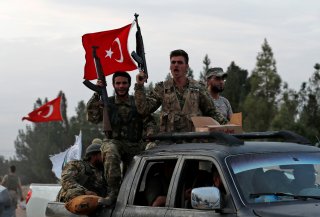Inside the Bloody Business of Turkey’s Syrian Mercenaries
Corruption is endemic to the process, and the high levels of graft—touching recruitment, basing, and the return—empower armed actors in Syria’s northwest, evidence of how foreign interventions can sustain war economies.
Libyan militias have long been resistant to mercenaries from Syria. According to Jalel Harchaoui, a Libya expert, “Turkey’s intervention with Syrian mercenaries was a bitter pill to swallow for the GNA.” The GNA needed ammunition, equipment, logistics, air defense, and much more, but there was no shortage of manpower, and they never asked for foot soldiers. Armed groups, like the Special Deterrence Force, refuse to allow a Syrian presence in the city center. In the eyes of many, the presence of Syrian mercenaries is a humiliation; they represent Libyans’ powerlessness vis-à-vis outside actors, even when those foreign powers ostensibly intervene on their behalf.
The deaths near Mitiga Airport briefly punctuated the monotony on base, where there is significant money to be made off boredom. Abo Moiad, for example, is a commander in the al-Hamzat militia and known as a chief smuggler of crystal meth. According to fighters, Moiad often exchanged drugs for a cut of his subordinates’ salaries, and many poor fighters are in his debt.
Fed up with their situation, mercenaries are increasingly voicing their dissatisfaction on Telegram channels. One fighter from the Sultan Murad group recently commented: “For the past four months we haven’t received salaries, grocery stores on base are empty. The commanders aren’t paying salaries or sending people home.” Some fighters have been arrested for filing complaints. Others requested funds from their families to survive.
Nonetheless, more young men want to sign up, a testament to desperate economic conditions in northwest Syria and the fact that potential recruits believe there won’t be fighting in Libya. Abo Saied, the recruiter, remarked: “I get an endless number of calls from people asking me to send them to Libya. Now, they will even offer me their first and second salary.”
Tensions are rising both in Tripoli and Nagorno-Karabakh, but it is unclear if Syrian mercenaries will again play a prominent role in future clashes.
Libya’s rival prime ministers, Abdul Hamid Dbeibah and Fathi Bashagha, are struggling for control of Tripoli, but Syrians on base don’t expect to mobilize. For the majority, that may be the case. Those located in Tripoli’s southern suburbs and Misrata are unlikely to see action.
However, mercenaries located in Janzur, west Tripoli, may find themselves blocking pro-Bashagha militias from the west. Mahmoud ben Rajab, a Libyan commander and Dbeibah ally with close connections to Turkey, is one of the few who could deploy Syrians. Rajab doesn’t have many armed Libyans under his command, and his “existing political image could potentially withstand the use of Syrians,” according to Harchaoui.
Despite an early August Azerbaijani offensive in Nagorno-Karabakh and increasingly belligerent rhetoric from the Azerbaijani government, Syrian recruiters are unaware of any new programs for the region.
Rumors, however, have begun to swirl that a “peacekeeping” force will soon deploy to Yemen to enforce a ceasefire. Former fighters like Hasan know all too well that anything said about the upcoming mission is unlikely to be true.
Note: The names of fighters and recruiters have been changed to protect their identity. Jiger Hussain contributed invaluable information and helped facilitate many interviews for this article.
John Lechner is a former financial analyst, now a freelance journalist. He writes on the politics and languages of the former Soviet Union, Turkey, and Africa, with a special focus on the Central African Republic. He speaks Russian, French, Turkish, Georgian, Chechen, and Sango Twitter: @JohnLechner1.
S. Asher is a graduate student at UC Berkeley and an open-source investigator.
Image: Reuters.

